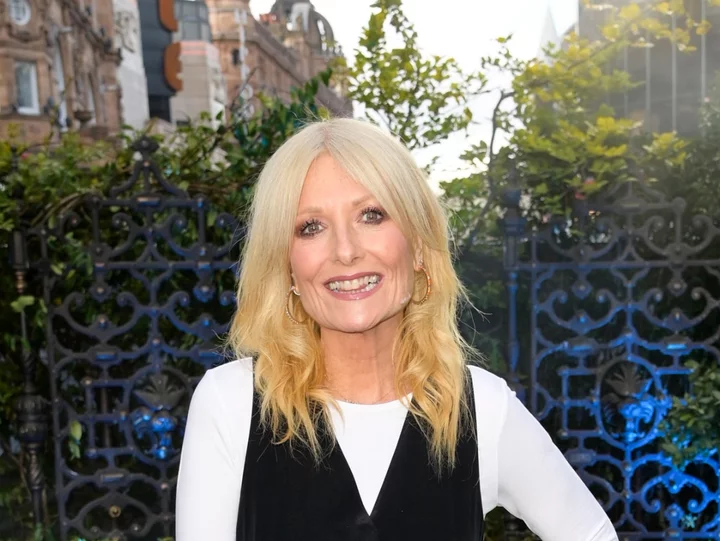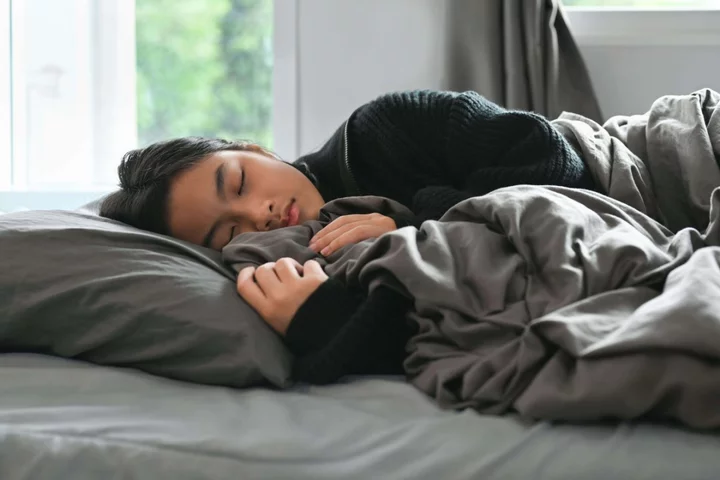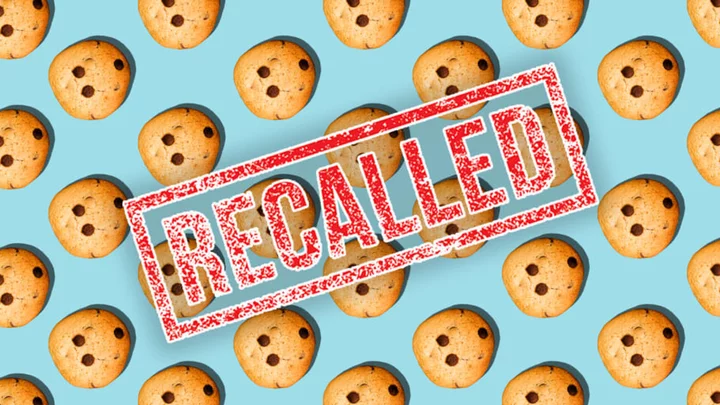
Rita Ora and James Arthur set for Hits Live Manchester 2023
Hits Live is returning to Manchester and Birmingham with stacked line-ups.
2023-09-27 18:23

The 1975 to go on 'indefinite hiatus' from live shows
Matty Healy made the announcement whilst performing in the US.
2023-09-27 18:18

Gaby Roslin says she’ll ‘never apologise’ for saying she’s happy post-divorce
TV presenter Gaby Roslin has said she will “never apologise” for telling people she’s happy, after she experienced moments of grief following her divorce. The former The Big Breakfast presenter and author, 59, was married to musician Colin Peel for almost a decade. They share a daughter together. “Not all my life has been joyful. My mum died young. I’ve been through divorce and lost some of my dearest friends,” she told Prima magazine. “You go through those things and you realise that life is precious and, without sounding trite, I will never apologise for saying I’m happy.” Roslin’s mother died just over 20 years ago, around the time she was beginning a new job. The TV star said that it feels like she and her husband of 18 years, David Osman, “fit together”. She shares another daughter with Osman. “We still really appreciate what we have,” Roslin, who presents a show on BBC Radio London along with sints on BBC Radio 2’s The Zoe Ball Breakfast Show and BBC One’s Morning Live, said. “The things that makes it work is that we’re not in competition with each other: We’re very, very different.” Speaking about how “life is crappy for a lot of people”, she added: “I’m someone who has always been very positive and full of laughter, but I’m aware that it’s not something everyone can hold on to. “There are coping mechanisms that have helped me, and I know they can help others, too.” Roslin revealed that some of her personal coping mechanisms have included giving up alcohol five years ago, and going for walks. “There’s a lot of ageism out there,” she said. “It’s no secret in my industry, but it’s everywhere. You can’t do this or that if you’re a certain age. No! I’m lucky that I’ve carried on working, but I have friends who have experienced it. “I know an actor who, at 55, was going for the part of someone older than her and was told that she was too old. They cast a 40-year-old. That’s so wrong.” Roslin is preparing to release her new guided journal, Spread The Joy: Simple Practical Ways To Make Your Everyday Life Brighter, which focuses on stories, illustrations, anecdotes and tips and tricks. The full interview is available now in Prima’s November issue in supermarkets and online at Mags Direct. Additional reporting by Press Association. Read More Sophie Turner and Joe Jonas reach agreement after child custody row Who is Laura Gallacher, Russell Brand’s wife of six years? Everything we know about Katy Perry and Russell Brand’s short-lived marriage Why is my teenager sleeping so much? Sounds that can help you fall asleep better Holidays to the homeland could help children hold onto family’s original language
2023-09-27 18:16

Why is my teenager sleeping so much?
When you think about it, teenagers are a lot like pandas. Like the black and white bears, teens often have a tendency to lounge around for hours, munch their way through massive amounts of grub, and snooze for extremely long stretches. It’s not unusual for youngsters to emerge zombie-like from their bedrooms hours after parents and little ones have arisen on weekend mornings, or have a ‘disco nap’ in the afternoon. But how can you tell if your child’s sleeping habits or typical for a teen – or a cause for concern? How much do teens need? “Sleep research suggests that a teenager needs between eight and 10 hours of sleep every night, so slightly more than an adult or younger child requires,” says Dr Hana Patel, sleep expert at Time4Sleep. “This is because teenagers need additional sleep to support their rapid physical, intellectual, and emotional development.” Chris Tattersall, sleep expert and MD of Woolroom explains: “They are going through a second developmental stage of cognitive maturation. Additional sleep supports their developing brain, as well as physical growth spurts.” However, it’s estimated that most adolescents in the digital age only get about 6.5 to 7.5 hours sleep. Tattersall says: “With the increased use of social media scrolling before bedtime, this is affecting thousands of teenagers’ sleep because the blue light from screens suppresses melatonin levels and delays sleepiness.” What happens if they don’t get enough sleep? “Teenagers not getting enough sleep can lead to all sorts of potential issues,” says Tattersall. Psychological symptoms may include, he warns: “Depression, difficulty concentrating, memory loss, anxiety and low self-esteem.” Plus, there’s the risk of weight gain due to eating more sugary foods to combat tiredness. “Not only does it have negative effects on their general wellbeing but it can also affect their academic performance,” Patel adds. Is it possible to sleep too much? It may seem counterintuitive, but sleeping too much can actually make young people more tired. “Anything over eight to 10 hours of sleep for teens could be considered excessive and may cause daytime sleepiness,” says Patel. “This can negatively affect interpersonal relationships, extracurricular activities, general health and, for older teens, driving too.” It’s important for parents to watch for signs that teens are struggling with sleep. “Look out for concentration difficulties, shortened attention span, memory impairment and lack of enthusiasm or energy,” Tattersall says. “You also might notice moodiness and aggression, poor decision-making, and signs of depression.” Patel says: “Sometimes teens may also complain of symptoms like headaches and migraines.” Try to encourage good ‘sleep hygiene’ in terms of a youngster’s evening routine, meaning avoiding large meals and caffeine before bed and creating a relaxing bedroom environment. “If possible, reduce the use of devices like smartphones and tablets, TVs or computers in the bedroom at night, as the light from the screens interfere with sleep,” Patel says. “If you are concerned about your teenager’s sleeping habits and the effects of this on their health, consult with your GP.” Read More Charity boss speaks out over ‘traumatic’ encounter with royal aide Ukraine war’s heaviest fight rages in east - follow live Kate gives a lesson in autumnal power dressing in a green trouser suit How can I boost my soil when I go peat-free? See Cate Blanchett champion sustainable fashion at glamorous Giorgio Armani show
2023-09-27 16:26

5 signs of frontotemporal dementia: Bruce Willis’s condition explained
Emma Heming Willis, actor Bruce Willis’ wife, provided an update on her husband’s health in a new interview with the Today show. She said being a celebrity does not change the reality of living with a disease like frontotemporal dementia. “You know what I’m learning is that dementia is hard. It’s hard on the person diagnosed, it’s also hard on the family,” she explained. “And that is no different for Bruce or myself or our girls. When they say this is a family disease, it really is.” Willis’ family first announced his diagnosis of frontotemporal dementia in March. At the time, they wrote they had the “deepest gratitude for the incredible outpouring of love” following the initial news. Here we take a closer look at the condition, known as FTD. – What is FTD? FTD refers to a group of illnesses that primarily affect the frontal and temporal lobes of the brain, which are associated with behaviour, personality, and language, per the Mayo Clinic. It’s often misdiagnosed as Alzheimer’s disease or a psychiatric problem, and it often begins between age 40 and 65. FTD accounts for between 10 and 20 per cent of all dementia cases. – What causes FTD? It’s not clear what causes FTD. Certain genetic mutations have been linked to the condition, but many people who develop FTD do not have a family history of the illness. The NHS says that, like other forms of dementia, FTD tends to develop slowly and get gradually worse over the years. – What are the symptoms of FTD? There are two types of FTD – behavioural variant FTD (bvFTD) and primary progressive aphasia (PPA). BvFTD, which results from damage to the frontal lobes of the brain, mainly causes problems with behaviour and personality. PPA, when damage occurs to the temporal lobes on either side of the head nearest the ears, causes language problems. Alzheimer’s UK says that FTD symptoms are “very different” to other more common types of dementia, such as day-to-day memory loss – adding that in the early stages of the disease, many people can still remember recent events. The symptoms can be distressing to family members, as they include lack of judgment, inappropriate social behaviour, decline in personal hygiene, compulsively putting things in one’s mouth, and eating inedible objects. People may also show a lack of interest in their activities, which is sometimes mistaken for depression, and they may exhibit a lack of empathy. – How is FTD treated? According to Dementia UK, there is no prevention or cure for FTD and it is often best to “focus on practical strategies to help the person live as well as possible with the diagnosis”. Willis’ family said that the lack of treatment for the disease was “a reality that we hope can change in the years ahead” with further research. They added that they hope media attention will be used to raise more awareness of FTD. “Bruce always believed in using his voice in the world to help others, and to raise awareness about important issues both publicly and privately,” they said. “We know in our hearts that – if he could today – he would want to respond by bringing global attention and a connectedness with those who are also dealing with this debilitating disease and how it impacts so many individuals and their families. “Bruce has always found joy in life – and has helped everyone he knows to do the same.” Read More Charity boss speaks out over ‘traumatic’ encounter with royal aide Ukraine war’s heaviest fight rages in east - follow live Kate gives a lesson in autumnal power dressing in a green trouser suit How can I boost my soil when I go peat-free? See Cate Blanchett champion sustainable fashion at glamorous Giorgio Armani show
2023-09-27 02:16

Sounds that can help you fall asleep better
A sleep expert has revealed which sounds help you get to sleep – and which ones are the best to wake up to. Sleep expert Hannah Shore claims ocean waves, a crackling fire and the distant buzzing of a fan are among the top ten sounds that help people fall asleep. Whereas hearing a piece of toast being cut or a kettle boiling is most likely to make them rise and shine gently. It comes after a poll which looked at 2,000 adults, found half enjoy listening to white noise to go to sleep or wake them up. The study, commissioned by Premier Inn, found 26 per cent listen to it every night, with rainfall sounds (40 per cent), music (34 per cent) and the sound of a fan (24 per cent) among the top choices. The hotel chain has launched Nod-Flix: an ASMR channel where guests can have their optimal video and soundscape play as they drift off. Hannah Shore, who is working with the hotel brand in partnership with Silentnight, said: “Depending on the individual, watching or listening to something calming before bed can be part of our sleep process. “Different sounds generate different responses from our subconscious when we’re asleep, so what might be soothing to one, might not be for another. “If you’re sharing a bed or a room, be considerate and invest in a pair of headphones or why not try finding a sound that you both find soothing?” The study also found that if they are sharing a room with other people and unable to listen to their white noise, 27 per cent wouldn’t be able to sleep properly as a result. More than half (58 per cent) normally listen to these sounds or noises on their phone, while 34 per cent tune in via an app. But 15 per cent even have a sound machine. Wind sounds (21 per cent), audiobooks (16 per cent) and a cat purring (seven per cent) also made the list of sounds and noises people like to fall asleep to. It also emerged half of the adults polled feel their sleep varies depending on the season we’re in. And 57 per cent reckon they sleep the best during autumn or winter, compared to only seven per cent who get the best shut-eye over the summer months. Respondents were shown a number of hotel-inspired ASMR type videos from the Nod-Flix channel, from the kettle boiling to a suitcase being pulled along hard floor. It found the sound of sizzling bacon was found to be most relaxing, followed by the trickle of running water from the shower. The study carried out via OnePoll.com, also revealed the sound of a vacuum was surprisingly least calming. Hannah Shore, for Premier Inn, added: “Switching off does not come as easy to some people as it does others and sounds are a great way to help with this. “Some people prefer complete silence whereas to others the silence means they listen out for all the little sounds, in a hotel this can be people walking down the hall, doors closing, the lift. “Others may find they need their brain to concentrate on something else, in these cases there needs to be something in the sounds they can focus on like the slow rhythm of calming music, the repetitiveness of waves lapping on the beach or even the noise of the TV. “This can allow the mind to switch off from the day and therefore allowing you to fall asleep, which we hope the Nod-Flix channel will accomplish for many.” Some noises that help Brits sleep better: Rainfall sounds Music Ocean sounds The sound of a fan The sound of favourite TV show/ streaming service Wind sounds Podcasts Audio Books Jungle/forest/woodland sounds Fireplace sounds Static sounds City ambience Animal sounds A cat purring The sound of a vacuum cleaner Here are some tips for a restful sleep: If you’re going to watch something before bed, make sure it’s calming content Keep the space you’re sleeping in tidy Don’t eat a heavy meal before bed Invest in some bed socks – they help increase blood circulation Make sure your pillow supports your sleeping position Dim the lights – it helps our bodies to produce sleep hormones like melatonin Get some black out blinds or curtains to block out bright lights White noise such as fans, hairdryers, hoovers are great for blocking out sound. If you want to go to sleep in a calmer way, pink noise is also good - think of wind, steady rain and reselling leaves. Green noise is similar to pink but will have an undertone of more constant hissing noise but still nature led such as running streams. To help you focus throughout the day, brown noises such as the crack of thunder which have deeper tones works really well. Read More Sleep expert reveals the simple secret to a good night’s rest Irregular sleep patterns linked to harmful gut bacteria, study suggests What is the 10-3-2-1-0 sleep method? How to spend the perfect healthy Super Saturday – according to science Holidays to the homeland could help children hold onto family’s original language The cure for smelly garlic breath? Turns out, it’s simpler than you think
2023-09-26 20:22

'I'd be really interested in looking at it': Francis Lawrence is willing to direct another Hunger Games film
Francis Lawrence is open to making another movie in the 'Hunger Games' franchise if author Suzanne Collins has a strong idea.
2023-09-26 17:47

Stormzy set for 2024 Formula One British Grand Prix performance
Stormzy, Pete Tong's Ibiza Classics and Rudimental are the acts currently confirmed to play Silverstone.
2023-09-26 17:21

Gok Wan leads stars donating clothes to swap shop
Gok Wan, Heidi Range and Joe McElderry are among the stars to have donated clothes to the Foxy Laundrette pop-up, which will open its doors in Hull this weekend.
2023-09-26 13:15

Antarctica’s Shrinking Sea Ice Hits a Record Low, Alarming Scientists
At its largest expanse this year, sea ice covered less than 17 million square kilometers (6.6 million square
2023-09-26 09:47

Death & Horror: How BBC’s Controversial Sound Effects Album Became a Surprise Hit
The campaign to ban “Sound Effects No. 13 – Death & Horror” didn’t stop it from becoming the first sound effects album to break the UK Top 100 charts in the 1970s.
2023-09-26 01:29

How Do Rocks, Metal, and Other Foreign Materials Get Into Our Food?
A bacteria-related food recall is troubling but understandable. It’s a little weirder when one involves golf balls.
2023-09-25 21:18
